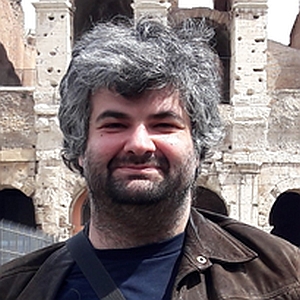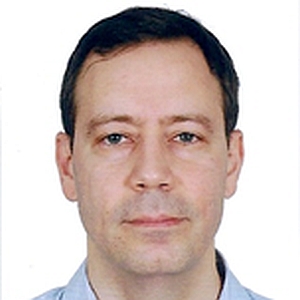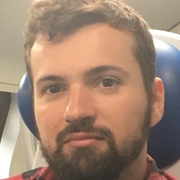alumni
Dr. Georgios Pastras was born in Patras, Greece in 1980. He received his BS in Physics from University of Patras in 2002 and he obtained his PhD in Physics from Harvard University in 2009. He has worked as a post-doctoral scientific collaborator in École Polytechnique Fédérale de Lausanne, University of Patras, National Technical University of Athens and he is currently a post-doctoral scientific collaborator at the Institute of Nuclear and Particle Physics in the National Center for Scientific Research “Demokritos” and principal investigator of the research program "HAPPEN".
He has conducted research on Spontaneous Metastable Supersymmetry Breaking, Little Higgs Models, Black Hole Thermodynamics in Higher Derivative Gravity, Tunneling Solutions in Quantum Field Theory, Entanglement in Quantum Field Theories, Holographic Entanglement Entropy, Pohlmeyer Reduction and Classical String Theory Solutions. Between 2012 and 2014, he had a side-career in Engineering, focusing on Energy Efficiency of Manufacturing Processes, Modelling of Nonconventional Manufacturing Processes and Robotics.
Dr. Georgios Pastras has taught in Harvard University for nine semesters as a teaching fellow. He has received the ”Certicate of Distinction in Teaching” by the Derek Bok Center for Teaching and Learning twice and he has been awarded with the ”Harold T. White Prize for Excellence in the Teaching of Physics” by the Physics Department. Finally, he has received research funding from the Greek State Scholarship Foundation (2017-2019) and the Hellenic Foundation for Research and Innovation (2019-).
Recent Publications:
Katsinis D., Mitsoulas I., Pastras G., “Stability Analysis of Classical String Solutions and the Dressing Method”, arXiv:1903.01412 [hep-th]
Katsinis D., Mitsoulas I., Pastras G., “Salient Features of Dressed Elliptic Strings on R×S2”, arXiv:1903.01408 [hep-th]
Pastras G., Fysikopoulos A., Chryssolouris G., “A Theoretical Investigation on the Potential Energy Savings by Optimization of the Robotic Motion Profiles”, RCIM, Volume 58, pp 55–68 (2019)
Katsinis D., Mitsoulas I., Pastras G., “Dressed Elliptic String Solutions on R×S2”, Eur.Phys.J. C78 (2018) no.8, 668, arXiv:1806.07730 [hep-th]
Katsinis D., Mitsoulas I., Pastras G., “Elliptic String Solutions on R×S2 and Their Pohlmeyer Reduction”, Eur.Phys.J. C78 (2018) no.11, 977, arXiv:1805.09301 [hep-th]
Katsinis D., Pastras G., “An Inverse Mass Expansion for Entanglement Entropy in Free Massive Scalar Field Theory”, Eur. Phys. J. C78 (2018) no.4, 282, arXiv:1711.02618 [hep-th]
Pastras G., “On the Holographic Entanglement Entropy for Non-smooth Entangling Curves in AdS4”, Fortsch.Phys. 66 (2018) no.3, 1700090, arXiv:1710.01948 [hep-th]
Pastras G., “Revisiting the O(3) Non-linear Sigma Model and Its Pohlmeyer Reduction”, Fortsch.Phys. 66 (2018) no.1, 1700067 , arXiv:1612.03840 [hep-th]
Pastras G., “Static Elliptic Minimal Surfaces in AdS4”, Eur. Phys. J. C77 (2017) no.11, 797, arXiv:1612.03631 [hep-th]
I am a postdoc in Theoretical Physics. My research interests include string theory, quantum field theory and integrability in the context of the AdS/CFT correspondence. I am currently working on the computation and the study of the properties of one-point functions in holographic defect conformal field theories.
SELECTED PUBLICATIONS
M. de Leeuw, C. Kristjansen, G. Linardopoulos, Scalar One-point Functions and Matrix Product States of AdS/dCFT, Phys.Lett. B781 (2018) 238 [arXiv:1802.01598].
M. de Leeuw, C. Kristjansen, G. Linardopoulos, One-point Functions of Non-protected Operators in the SO(5) symmetric D3-D7 dCFT, J.Phys. A: Math.Theor. 50 (2017) 254001 [arXiv:1612.06236].
E. Floratos, G. Linardopoulos, Large-spin and Large-winding Expansions of Giant Magnons and Single Spikes, Nucl.Phys. B897 (2015) 229 [arXiv:1406.0796].
E. Floratos, G. Georgiou, G. Linardopoulos, Large-spin Expansions of GKP Strings, JHEP 03 (2014) 018 [arXiv:1311.5800].
Patrick Asenov has obtained his MSc in Electronics and Automatic Control at the School of Electrical and Computer Engineering, NTUA, in 2016. As undergraduate intern he has worked with Conductive AFM at the Institute of Nanoscience and Nanotechnology, NCSR “Demokritos”, in order to study the memristive properties of thin films. As undergraduate student he has performed a Monte Carlo study on thin films with memristive properties, which contain nanoparticles that affect locally the electric field. He is currently a doctoral student participating in the Phase-II Upgrade of the CMS Tracker. His research interests include electrical and climate test characterizations of semiconductor detectors, simulations of particle-matter interactions to examine the behavior of silicon pixel and strip sensors traversed by charged particles, development of tracking algorithms for future high-rate particle telescopes, upgrade of the Detector Instrumentation Laboratory (DIL) at NCSR “Demokritos” to a Process Quality Control (PQC) Center for the Outer Tracker sensors, electronic tests on pixel detector modules and analysis of data from beam tests at CERN and other irradiation facilities. He has also been an intern at KIT and a laboratory course assistant at NTUA (Electronics, Waves and Quantum Mechanics, Electromagnetism and Optics, Detector Instrumentation), while also frequently participating in the support group for the CERN International Masterclasses in Particle Physics and other local scientific exhibitions and conferences. His complete list of publications can be found on his INSPIRE-HEP and Google Scholar profiles.



